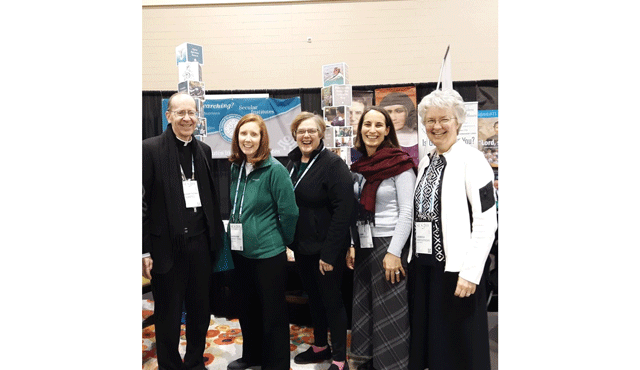In his homily for the 2019 World Day for Consecrated Life, Pope Francis called consecrated life a prophetic vision in the Church needed in today’s world.
Pope Francis said consecrated life “is a vision of what is important to embrace in order to have joy: Jesus.”
But the Holy Father was not referring to priests, sisters, or other members of traditional religious communities, but to men and women who commit themselves to consecration and a spiritual lifestyle – living, working, and functioning in the world at large.
The Diocese of Orange Delegate for Consecrated Life Joan Patten, AO, a member of the Institute of Apostolic Oblates, grew up with traditional sisters and brothers and was attracted to the joy, simplicity, and life of prayer those communities offered. Yet, she sought something different.
When she discovered the institute, she felt called to its mission to promote prayer and holiness. “I understood in prayer how God is inviting me to love and receive His love in a way that’s full, total, and life-giving,” she says. She joined the institute in 2007.
“I wasn’t looking for this life and hadn’t heard of it before, but I found myself falling in love with God in this particular way,” recalls Patten, 37, who lives at the Apostolic Oblates’ Pro Sanctity Center in Fullerton. “I felt that God was inviting me to consider giving my life to Him.”
Consecrated life as described by Pope Pius XII in 1947 takes many forms; consecrated individuals include among others, hermits, consecrated virgins, and members of secular institutes.
While priests, sisters, and nuns traditionally live and work separately from the ‘real’ or secular world, “the whole point [of consecrated life] is to combine the two realities of the temporal or secular world and the Church,” Patten explains. Living independently or in small communities, members of secular institutes often own homes and cars and work at jobs outside the Church.
Members of secular institutes promise themselves to God for life. They take the traditional evangelical counsels of poverty, chastity, and obedience, and their consecration requires years of discernment culminating in final vows.
A member of the Caritas Christi Secular Institute living in Phoenix, Donna Kurgan, 58, says consecrated life poses issues as well as offering blessings. “Every day I’m challenged by Christ as to how I’m going to live my life, walk that walk – really listening to that little voice inside and walking with it and hearing it.”
Kurgan notes that Caritas Christi’s specific charism is “remaining in the place where Providence has placed you, where you don’t leave your home or your family, but rather consecrate yourself to God right where you are.
“This was key in my discernment process,” she adds. “I didn’t feel God was calling me to go around the country or the world, but to bring His presence right where I was.”
Kathy Tierney, 53, of Indianapolis, is principal officer and formator for the De Sales Secular Institute and a registered dietician nutritionist who found herself in her mid-30s not sure about the kind of life she wanted to lead.
“I’d been reading about Teresa of Avila and Clare of Assisi, who wrote about being a bride of Christ,” Tierney remembers. “I felt that Jesus wanted me to be His bride. It seemed very fulfilling to me. He led me to that decision and when I made a vow to Him, I felt great peace.”
She views her celibacy as a gift from Christ. “God led me to this life,” she says. “I don’t feel alone because I’m very aware of Jesus. I think about Him a lot, talk to Him, and He is present with me.”
Jessica Swedzinski of Staten Island, NY is a member of the Secular Institute of the Schoenstatt Sisters of Mary, formed in Germany in 1926, and serves on the national board of the executive committee for the U.S. Conference of Secular Institutes.
“We have about 260 institutes around the world – 18 in the United States – and 32,000 members worldwide,” Swedzinski says. “We are called to transform the world from within.
“We live our sacred bonds right where people are working, relating, sleeping, and eating.”
That many Catholics know little about consecrated life is unsurprising, Patten says. “There are so many different forms and ways to give your life to God. There are many needs in the world and the Holy Spirit has many ideas about particular charisms for people living in certain times.”
For Catholics considering consecrated life, Swedzinski offers this: “Take time to pray to Jesus because it’s His call, never our call. Despite what the world throws at us, time is short, and we need individuals to make good, strong decisions for eternity. Otherwise, a life like this would make no sense.”

